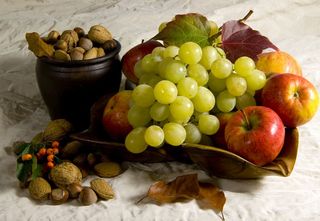Healthier Diets Include (Surprise!) Frequent Snacks

People who munch on snacks between meals tend to have healthier diets than those who stick to eating only at regular mealtimes, a new study finds.
The results showed people who snacked more frequently had higher amounts of fruit, whole grains and milk in their diets, and had lower levels of sodium.
"There is a widely held belief that snacking cannot be a part of a healthy diet," said study researcher Claire A. Zizza, an associate professor of nutrition at Auburn University in Alabama.
But the study showed that the more a person snacked, the more likely he or she was to eat both healthy snacks and healthy meals, Zizza said. "The increase was slight, but was still apparent."
Still, frequent snackers fell short of eating enough vegetables, and the overall healthiness of the study participants' diets left a lot of room for improvement.
"Everyone, regardless of the amount of snacking they did, had diets that are not as healthy as we would like to see," Zizza said.
The study was published online yesterday (Nov. 14) in the Journal of the American Dietetic Association.
Sign up for the Live Science daily newsletter now
Get the world’s most fascinating discoveries delivered straight to your inbox.
Survey of snackers
The researchers used data from 11,209 people ages 20 and older who participated, between 1999 and 2004, in the larger National Health and Nutrition Examination Survey, which includes interviews and physical exams. The researchers used a standard scoring system that ranks the healthiness of diets on a scale from 1 to 100, with higher scores indicating healthier diets.
The more times a day people snacked, the higher they tended to score, according to the study. People who reported never snacking scored 49.3, on average, while those who snacked four or more times a day averaged 51.6.
"Fruits pack [and] travel well, and they’re easy to eat as snacks," Zizza said.
In recent years, nutrition researchers have shifted their focus from single nutrients and foods to overall diet quality, as it has become clearer that it is the combination of foods in the diet that contribute to overall health, Zizza said. The scoring system used to rate study participants' diets took into account overall diet quality, she said.
The study also found that people who snacked more frequently tended to eat fewer vegetables, and had more solid fats (such as butter), alcohol and added sugar in their diets.
"Adults are not choosing vegetables as snacks," Zizza said. "Adults should also be encouraged to make healthier snack choices by selecting options that are more than 'empty calories.'"
Healthier diets
The findings were not surprising to some.
"It doesn't matter whether you eat a healthy food as a snack or as a meal — if it's healthy, it's healthy," said Rhonda Sebastian, a nutritionist with the U.S. Department of Agriculture.
Sebastian's 2008 study of more than 4,000 teenagers found that those who snacked were more likely to get more milk and fruit in their diets.
Still, most teens in the study didn't have very healthy diets, Sebastian said. For example, boys who didn't eat any snacks ate 0.7 servings of fruit a day, while those who ate four or more snacks ate 1.7 servings a fruit a day. The USDA recommends two cup-size servings of fruit a day.
Zizza's study, similarly, found snacking brought only very modest improvements in the overall health of people's diets, Sebastian said.
And both studies used data from the National Health and Nutrition Examination Survey, which does not set a definition for what constitutes a snack, leaving it open to study participants' interpretations, Sebastian said.
"A snack could be a Big Mac and fries — it's self-defined. A meal could be a "snack," she said.
But by eating healthier snacks, people can improve the overall health of their diets, both Zizza and Sebastian said.
"Most Americans need to eat more fruits and vegetables, and adding one or two of them as a snack is a small step we can make," Zizza said.
Pass it on: Eating snacks daily can make for a healthier diet.
This story was provided by MyHealthNewsDaily, a sister site to Live Science. Follow MyHealthNewsDaily on Twitter @MyHealth_MHND. Find us on Facebook.

Most Popular



